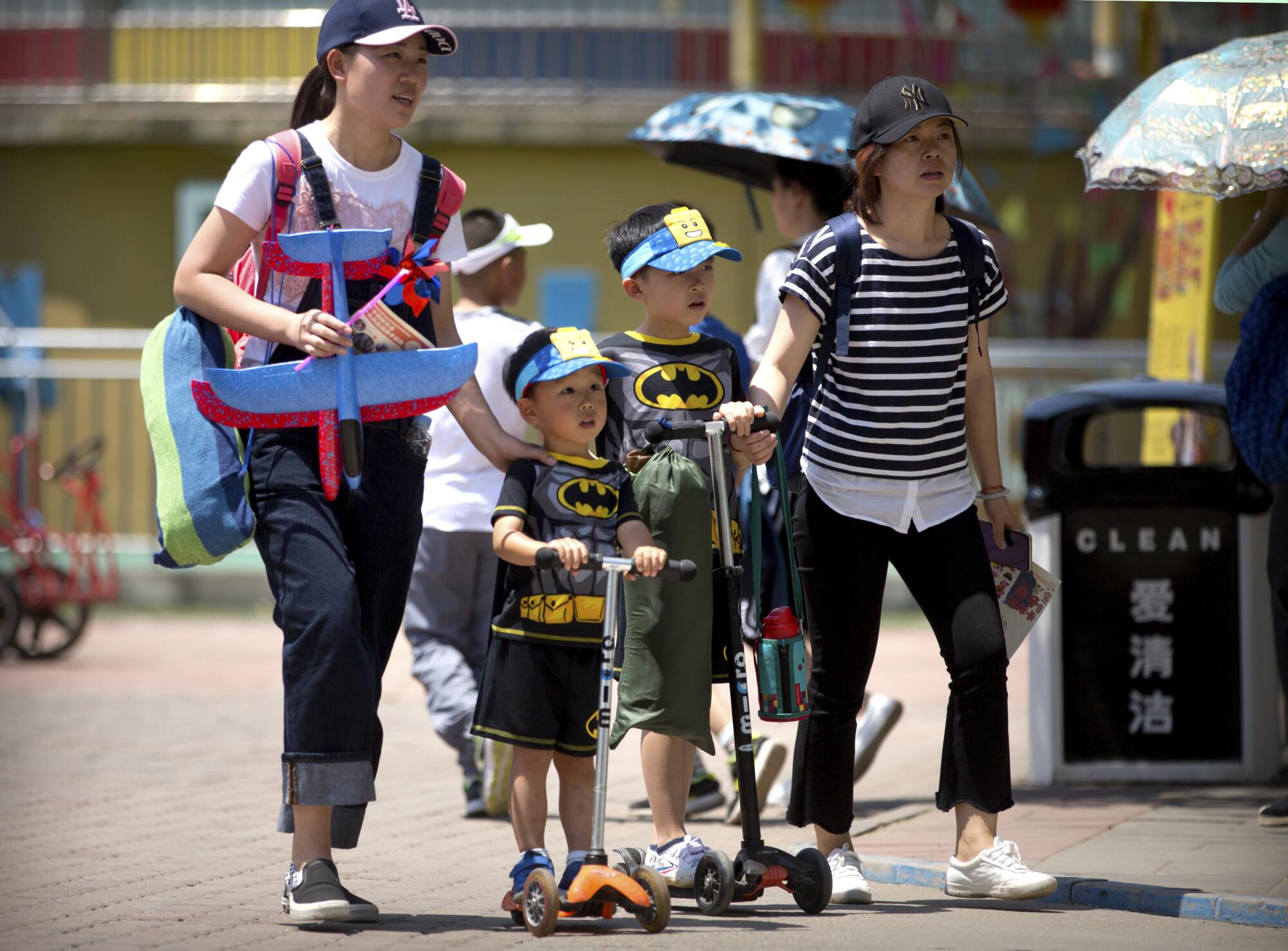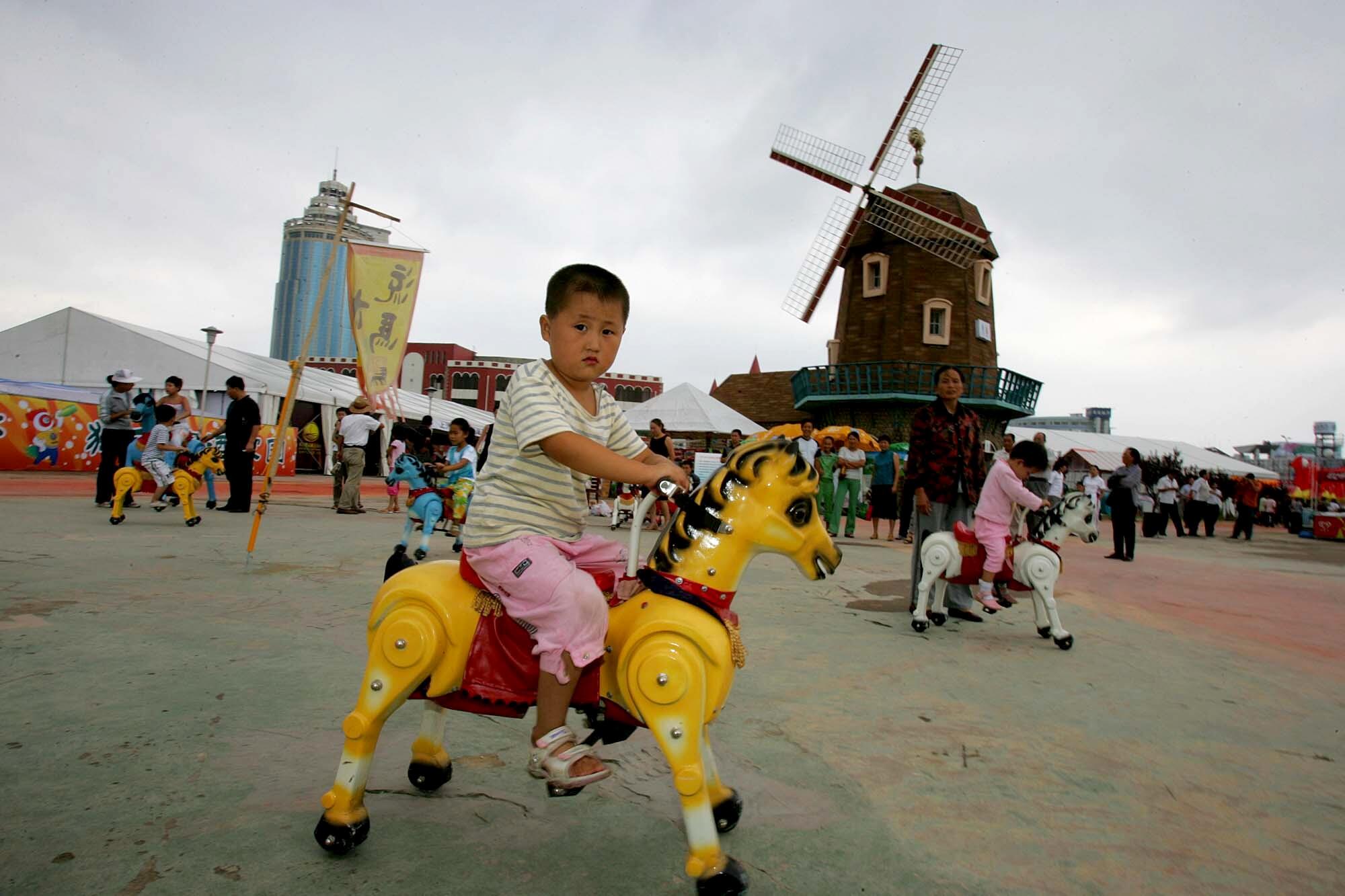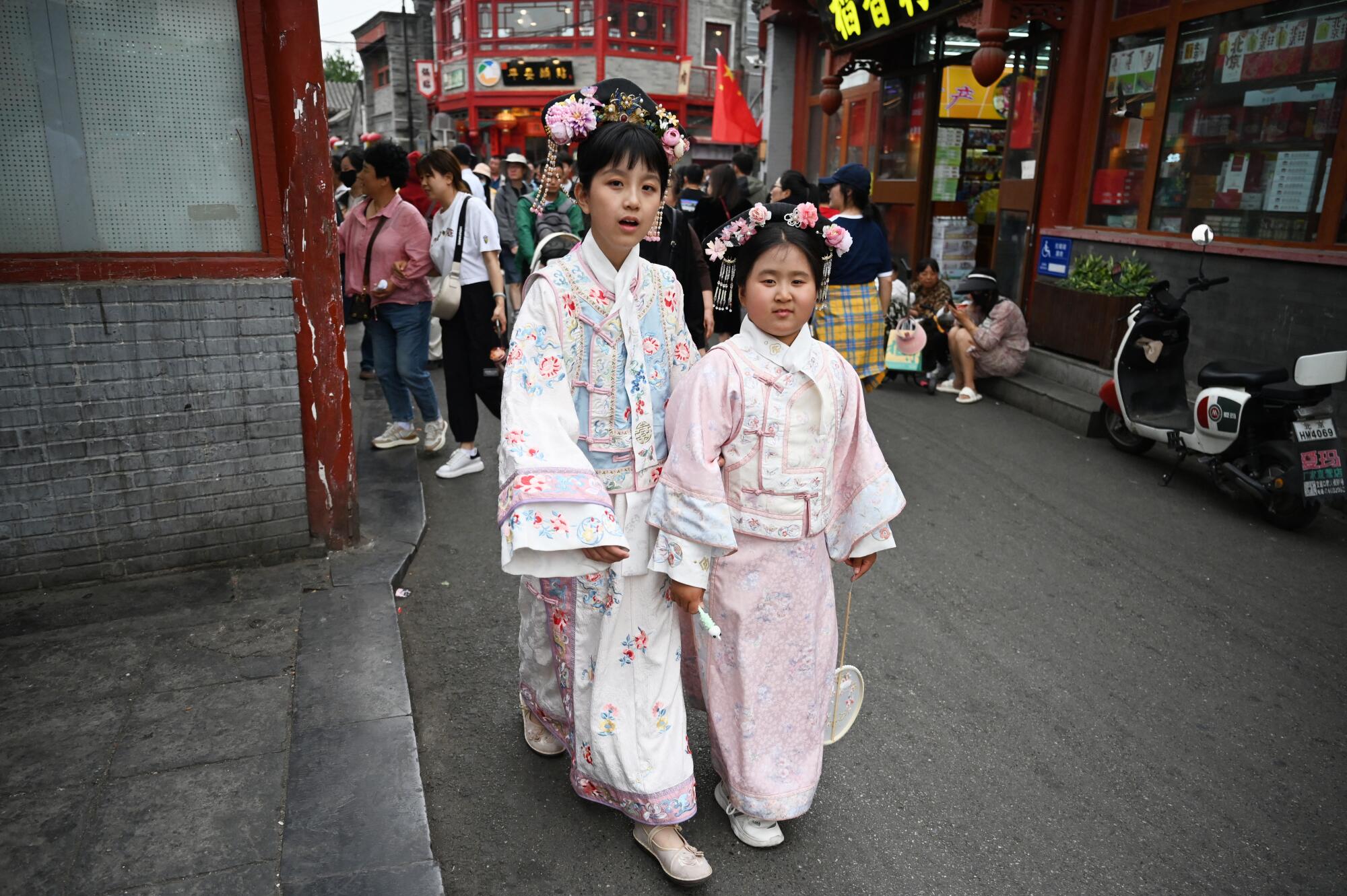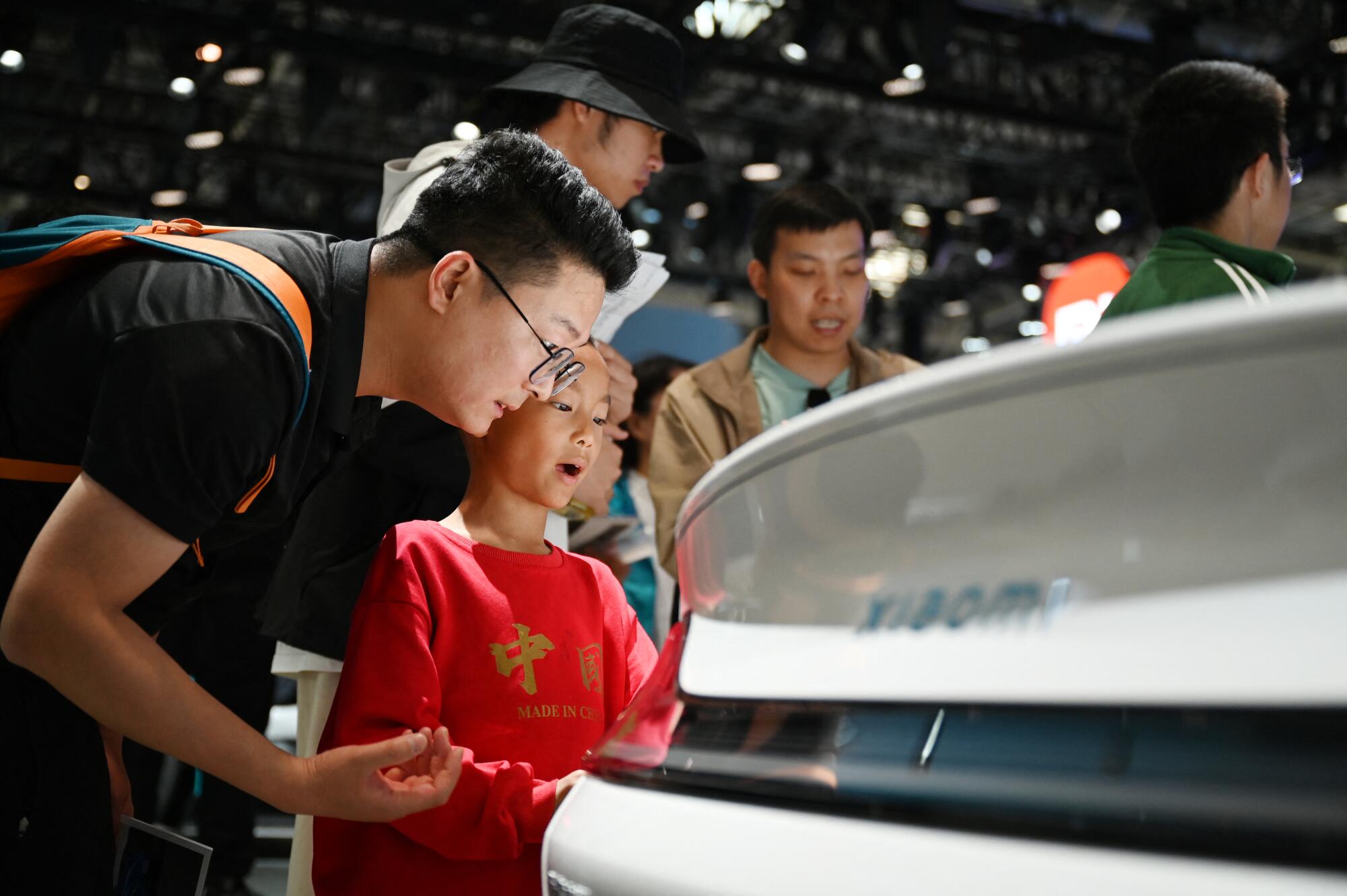The acronym DINK (double income, no children), short for gainfully employed American couples whose only responsibilities were to themselves, was coined to capture the brazen materialism of the 1980s.
Four decades later, the term has made a comeback, with millennials adopting it on social media to flaunt their free time, lavish spending habits and other perks of choosing not to have children.
It has taken off far beyond the United States, even in a country where it would have been difficult to imagine just a decade ago: China.
China once infamously limited couples to one child each to control population growth. That led to a shortage of young people, and in 2016 the government raised the limit to two children. In 2021, they became three.
China's population declined for the second year in a row last year; India overtook it as the world's most populous nation.
(Greg Baker/Associated Press)
Amid deep economic uncertainty, a growing number of Chinese are choosing another number: zero.
Many proudly refer to themselves as DINKs or dingkephonetic translation in Mandarin.
Xu Kaikai, 29, said being DINK gives her and her 36-year-old boyfriend a greater sense of control over their lives.
“It reduces some of the anxieties about age,” he said.
She works in advertising in Shanghai, where her boyfriend is a project manager for a construction company. “He used to talk about having a beautiful baby,” she Xu said.
She now calls herself a “drifting leaf” and gets so bored of people talking about children on social media that she only follows people who don't have them.
A recent study by the Luoyang Institute of Science and Technology estimated that DINKs made up about 38% of Chinese households in 2020, up from 28% a decade earlier, but those figures included large numbers of people living alone and research It did not analyze whether the couples were actually dual-income.
It's not that all Chinese adhere to a strict definition of the acronym. Some include anyone who doesn't have children, while others don't count people who still have a chance to change their mind: women of childbearing age or men without vasectomies.
It is also unclear how many DINKs there are in the United States. About 44% of couples ages 18 to 49 surveyed by Pew Research in 2021 said they were unlikely to have children, up from 37% in 2018.
The term DINK is not entirely new in China, but previously it used to refer to couples who wanted to have children but couldn't, not the ethos of childlessness by choice that they adopt today.

After decades of pursuing a one-child policy to keep population growth in check, China's government is now offering subsidies and financial support to encourage families to have more children.
(Mark Schiefelbein/Associated Press)
“It was just an upper-class phenomenon,” said Yuying Tong, a sociology professor at the Chinese University of Hong Kong who studies family life.
He said the number of DINKs is increasing largely because more and more people are delaying marriage.
The rejection of social norms comes at an inopportune time for the Communist Party, which is struggling to avoid a demographic crisis in which there are not enough young people to support the elderly.
The country's population declined for the second year in a row in 2023 (India overtook it as the world's most populous nation) and the birth rate fell 5.6% to a record low of 6.39 births per 1,000 people, slightly more than half the US rate. which has also decreased in recent years.
Now the Chinese government is trying to motivate people to have children, using subsidies and even matchmaking services.
In March, Chinese officials announced plans to provide more support for raising children and “work toward a pro-natal society,” including improving parental leave policies and child care options.
The government also seems to be trying to scare the DINKs into changing their thinking.
Last month, the Chinese Twitter-like platform Weibo promoted an article about DINK couples in China who regretted not having children because it had led to loneliness, marital conflict or inheritance problems.
“Being a DINK is a bet on the future,” said the publication, which was unsigned but received more than 8 million views. “It's a bet on whether you can maintain your original intention, on whether partners can trust each other, and, most importantly, on the complex changes of human nature.”

As economic growth has stalled, more Chinese couples are giving up on the idea of having children. According to the Beijing-based Yuwa Population Research Institute, the average cost of raising a child in China was one of the highest in the world.
(Elizabeth Dalziel/Associated Press)
DINKs disagreed with the characterization.
“Are all these examples being mentioned to encourage people to have children?” a popular entertainment blogger who goes by the name Jing Zhao Cha Mi responded on social media. “There are probably more people who regret their lifestyle with children.”
Hu Huiwen, a 38-year-old financial consultant living in the eastern city of Hangzhou, has heard all the warnings: Her husband will leave her. She will want children later and she will be too old to have them. No one will take care of her in her old age.
But in the five years since she vowed not to have children, none of that has happened.
“It could become a lesser penalty, but not to the point of regret,” Hu said. “Even if I regret it, I can only bear it myself. What else can you do?”
It belongs to three different group chats for DINK, where participants advise each other on how to spend their free time. In video diaries, he is shown reading or walking through parks admiring the foliage.
These ads in favor of a life without children do not facilitate the government's campaign to have children. Neither does the stagnant economy.

In March, the Chinese government emphasized the need to support child-rearing and “work for a pro-natal society.”
(Greg Baker/Getty Images)
A recent study by the Beijing-based Yuwa Population Research Institute found that the average cost of raising a child in China was $74,600, or 6.3 times GDP per capita.
Of the 14 countries included in the study, the only place where it cost more relative to income was South Korea, which has the lowest birth rate in the world.
“At the end of the day, it's still about the pressures and this very competitive environment that makes both marriage and motherhood unsustainable,” said Mu Zheng, assistant professor of sociology at the National University of Singapore.
When Zheng Yu, a 47-year-old fashion consultant living in Shanghai, was in her twenties, her friends and family saw her decision not to have children as a symptom of her rebellious nature.
Now, as income inequality increases and she sees the pressure her niece is under to excel, she said she and her husband would make the same decision again.
“Only if I don't have children will I be able to live the way I do now,” said Zheng, who has visited more than 50 countries. “I just have to think about myself, which is the part I enjoy the most.”
“Taking into account global political and economic trends, if you do not have a strong maternal instinct, you should not have a child just for the sake of it,” she said.
Vable Liu, a 29-year-old English teacher in Jinan, the capital of China's Shandong province, said about a third of her friends are stupid.
Liu and her husband recently posted a short video defending their choice.
“Will DINKs miss out on the joy of children?” she asks him in the clip.
They answer together: “Surely people with children are happy? “People with kids aren’t necessarily happy, maybe they miss out on the joy of being DINK.”

DINK couples make up about 38% of households in China in 2020, according to one study, up from 28% in 2010.
(Greg Baker/Getty Images)
They continued with their mock interview.
“What if your family pressures you?” “Stay away from them.”
“Who do you pass your wealth to when you die?” “Waste it all before that.”
Special correspondent Xin-yun Wu in Taipei contributed to this report.












